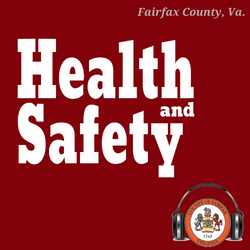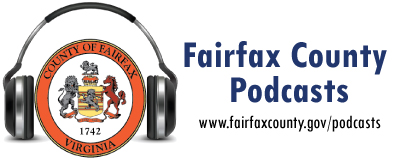Feb. 18, 2026
Hello, and welcome to the Fairfax County Health and Safety Podcast. Coming up, learn about digital safety, frostbite and hypothermia, and Punxsutawney Phil predicts more winter. Links to topics mentioned in this podcast can be found online at www.fairfaxcounty.gov.
You probably think about stocking food, water and first aid supplies when you plan for emergencies. But what about your digital life? Online threats are real, and they can cause serious problems during a crisis. Think about it: scammers love to take advantage of disasters. When wildfires, hurricanes or other emergencies hit, fake charity websites pop up. Phishing emails claim to be from FEMA or the Red Cross. Criminals know people are stressed and want to help, so they exploit that.
Your digital safety is part of your overall preparedness plan.
Common Online Threats You Should Know
Phishing Scams: These are fake emails or texts that try to steal your passwords or personal information. They often look like they come from real companies or government agencies.
Ransomware: This is malicious software that locks your computer or files until you pay money. It can destroy important documents, including copies of your insurance policies, emergency plans and family contact lists.
Social Media Scams: Fake posts about missing people during disasters, bogus fundraisers or false emergency alerts spread fast on social media.
Public Wi-Fi Risks: When you connect to free Wi-Fi at coffee shops or shelters, hackers can sometimes see what you’re doing online.
Simple Steps to Stay Safer Online
Use Strong, Unique Passwords
Create different passwords for each of your important accounts. A strong password has at least 12 characters and mixes letters, numbers and symbols. Write them down in a secure place or use a password manager app.
Turn On Two-Factor Authentication
This adds an extra layer of security to your accounts. Even if someone steals your password, they can’t get in without the second code sent to your phone.
Keep Your Software Updated
When your phone or computer asks you to update, do it. Updates often fix security holes that hackers can exploit.
Think Before You Click
Don’t click on links in emails or texts from people you don’t know. If an email claims to be from your bank or a government agency, go directly to their website instead of clicking the link.
Back Up Your Important Files
Save copies of your critical documents in more than one place. Use an external hard drive, a USB drive or a secure cloud service. If ransomware hits or your device fails during an emergency, you won’t lose everything.
Check Privacy Settings
Review who can see your posts on social media. Criminals can use information about your location, vacation plans, or family members for scams or worse.
Our emergency information blog has more on this and other preparedness information. Visit our blog at fairfaxcounty.gov/emergency/blog.
Frostbite and hypothermia will occur rapidly on any exposed skin. In extreme cold, being outdoors for a prolonged period is life-threatening. Wind chills at or below zero can cause frostbite on exposed skin in as little as 30 minutes. If you see an unsheltered person who may be at risk of hypothermia, call the police non-emergency phone line at 703-691-2131. Learn more about our Hypothermia Prevention Program, including shelter locations and warning signs. Just search hypothermia prevention program at fairfaxcounty.gov.
The groundhog saw his shadow this year, which means we’re in for six more weeks of winter. While Punxsutawney Phil isn’t exactly a meteorologist, this tradition gives us a good excuse to talk about late winter preparedness. February and March can bring some of the worst winter weather of the season. Just when you think spring is around the corner, another snowstorm rolls through. Ice storms love these months too. The temperature swings between freezing and thawing create dangerous conditions on roads and sidewalks. Many people run low on supplies by this point in winter. You might have burned through your stockpile of ice melt, batteries or canned goods. Your generator hasn’t been serviced in months. The snow shovel broke during the last storm, and you haven’t replaced it yet. Read more on our emergency information blog; fairfaxcounty.gov/emergency/blog.
Each month, our Department of Emergency Management and Security produces the “Emergency Preparedness” newsletter and a monthly preparedness webinar. Learn more at fairfaxcounty.gov/emergencymanagement.
Finally, Fairfax County's free alert system sends you important information during an emergency, helps you navigate your commute and shares community information. You can also customize your Fairfax Alerts to receive the information pertinent to you. Don't miss this important information! Sign up today for Fairfax Alerts at www.fairfaxcounty.gov/alerts.
That’s it for this edition of the Fairfax County Health and Safety Podcast, produced by the Fairfax County, Va., Government. Thanks for listening. Additional information about health and safety topics and emergency preparedness may be found on our emergency information blog at www.fairfaxcounty.gov/emergency/blog. Follow the Health and Safety podcast on soundcloud.com/fairfaxcounty and our podcasts webpage, fairfaxcounty.gov/podcasts. And remember, if you have a police, fire, or medical emergency, call 9-1-1. For non-emergency needs, call 703-691-2131.
Finally, Fairfax County's free alert system sends you important information during an emergency, helps you navigate your commute and shares community information. You can also customize your Fairfax Alerts to receive the information pertinent to you. Don't miss this important information! Sign up today for Fairfax Alerts at www.fairfaxcounty.gov/alerts.
That’s it for this edition of the Fairfax County Health and Safety Podcast, produced by the Fairfax County, Va., Government. Thanks for listening. Additional information about health and safety topics and emergency preparedness may be found on our emergency information blog at www.fairfaxcounty.gov/emergency/blog. Follow the Health and Safety podcast on soundcloud.com/fairfaxcounty and our podcasts webpage, fairfaxcounty.gov/podcasts. And remember, if you have a police, fire, or medical emergency, call 9-1-1. For non-emergency needs, call 703-691-2131.



 Listen Online or On the Go.
Listen Online or On the Go.